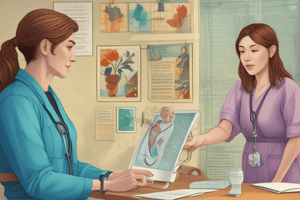Podcast
Questions and Answers
What does the transition from DOPE to POPE to HOPE signify in patient education?
What does the transition from DOPE to POPE to HOPE signify in patient education?
- Transition from hospital-based to home-based to community-based patient education
- Transition from disease-oriented to prevention-oriented to health-oriented patient education (correct)
- Transition from general education to specialized education in healthcare
- Transition from nurse-led education to doctor-led education
How has the role of the educator changed over time according to the text?
How has the role of the educator changed over time according to the text?
- From facilitator of change to expert advisor/teacher to wise healer
- From caretaker to lecturer to consultant
- From wise healer to expert advisor/teacher to facilitator of change (correct)
- From consultant to wise healer to caretaker
In the present role, what is emphasized for patients in terms of their potentials and abilities?
In the present role, what is emphasized for patients in terms of their potentials and abilities?
- Using their potentials, abilities, and resources to the fullest (correct)
- Relying solely on traditional medicine for treatment
- Dependence on medical professionals for all decisions
- Ignoring their own capabilities and resources
What does the current role of today's educator involve in terms of 'training the trainer'?
What does the current role of today's educator involve in terms of 'training the trainer'?
True or False: The role of the nurse has evolved into teaching other nurses instead of taking care of the sick.
True or False: The role of the nurse has evolved into teaching other nurses instead of taking care of the sick.
What has Florence Nightingale taught professionals about regarding hospitals and homes?
What has Florence Nightingale taught professionals about regarding hospitals and homes?
Flashcards are hidden until you start studying
Study Notes
Milestones in Patient Education
- In 1995, the Pew Health Professions Commission published competencies for the success of health professions in the 21st century, with over half focusing on patient and staff education and the nurse's role as educator.
Competencies
- Provide clinically competent and coordinated care to the public
- Involve patients and their families in the decision-making process regarding health interventions
- Provide clients with education and counseling on ethical issues
- Expand public access to effective care
- Ensure cost-effective and appropriate care for the consumer
- Provide for prevention of illness and promotion of healthy lifestyles for all Americans
Paradigm Shift
- The teaching role has evolved from a disease-oriented approach to a more prevention-oriented approach, focusing on teaching for the promotion and maintenance of health.
Integration into Comprehensive Plan of Care
- In the 1980s, greater recognition was given to client education as a healthcare activity, leading to the integration of patient education into comprehensive plans of care.
Delineation of Standards
- By 1933, the Joint Commission on Accreditation of Healthcare Organizations (JCAHO) delineated nursing standards for patient education, which are based on descriptions of positive outcomes of patient care.
- These standards require teaching activities by nurses that are patient- and family-oriented.
Patient Education as a Right
- By the 1970s, the American Hospital Association established the rights of patients to receive complete and current information concerning diagnosis, treatment, and prognosis in terms they can reasonably be expected to understand.
Evolution of the Role
- The role of the nurse educator has evolved from wise healer to expert advisor/teacher to facilitator of change, with an emphasis on empowering patients to use their potentials, abilities, and resources to the fullest.
- The role has transitioned "from disease-oriented patient education (DOPE) to prevention-oriented patient education (POPE) to ultimately become health-oriented patient education (HOPE)".
Studying That Suits You
Use AI to generate personalized quizzes and flashcards to suit your learning preferences.




